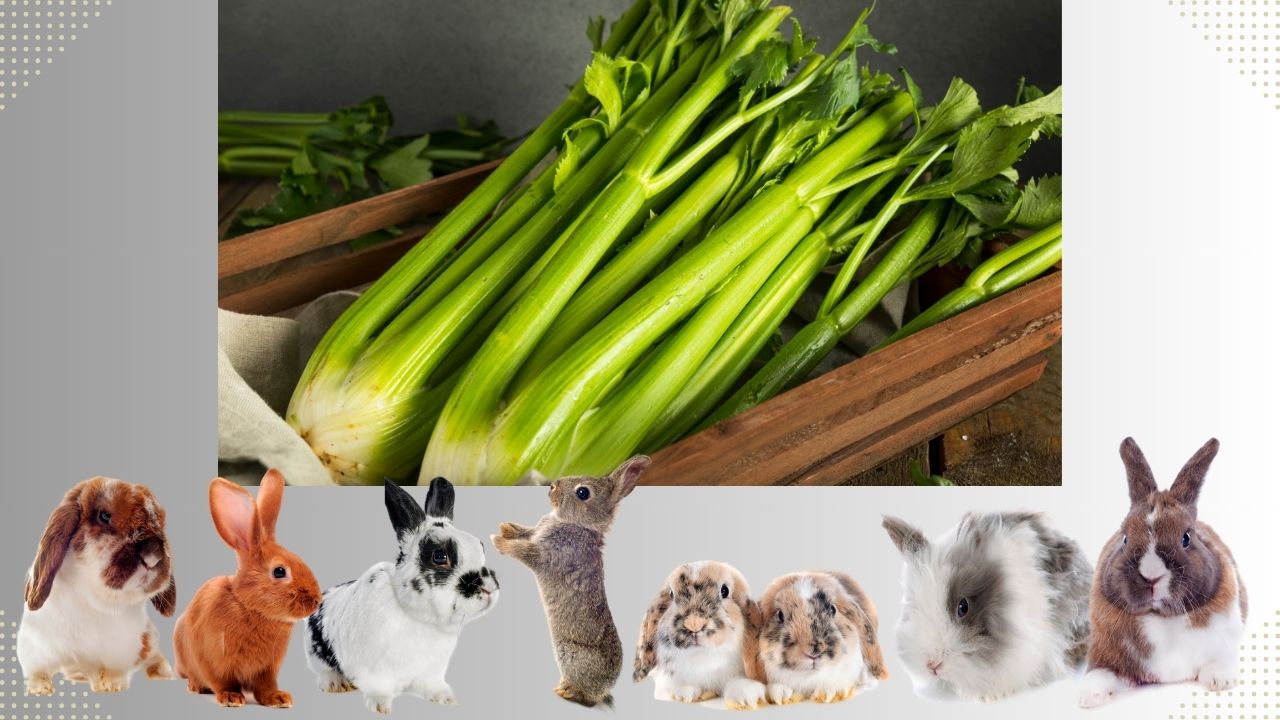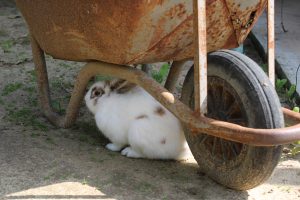Ever wondered how much celery your rabbit can munch on? Well, wonder no more!
In this article, we’ll dive into the nutritional value of celery for rabbits, the recommended serving size, and the potential health benefits.
But be careful not to overfeed your furry friend, as there are risks associated with excessive celery consumption.
Don’t worry, though, we’ll also guide you on how to introduce celery into your rabbit’s diet.
So, let’s get started on serving your bunny the right amount of crunchy goodness!
In This Article
- 1 Key Takeaways
- 2 The Nutritional Value of Celery for Rabbits
- 3 Recommended Serving Size of Celery for Rabbits
- 4 Potential Health Benefits of Celery for Rabbits
- 5 Risks of Overfeeding Celery to Rabbits
- 6 How to Introduce Celery to Your Rabbit’s Diet
- 7 Other Vegetables That Can Be Fed Alongside Celery
- 8 Monitoring Your Rabbit’s Celery Consumption
- 9 Frequently Asked Questions
- 9.1 Can Rabbits Eat the Leaves and Stems of Celery, or Just the Stalks?
- 9.2 Is It Safe to Feed Rabbits Celery Every Day?
- 9.3 Can Rabbits Eat Cooked Celery?
- 9.4 How Often Should I Introduce New Vegetables Into My Rabbit’s Diet?
- 9.5 Are There Any Alternatives to Celery That Provide Similar Nutritional Benefits for Rabbits?
- 10 Conclusion
Key Takeaways
- Celery is a great source of vitamins and fiber for rabbits, promoting healthy digestion.
- The recommended serving size of celery for rabbits is 1-2 tablespoons per day.
- Overfeeding celery can lead to digestive issues such as bloating, gas, and diarrhea.
- It is important to monitor the rabbit’s reaction and stool consistency after consuming celery, and to limit celery to a small portion of their daily vegetable intake.
The Nutritional Value of Celery for Rabbits
You should know that celery is a great source of vitamins and fiber for rabbits. When it comes to rabbit digestion, celery plays a beneficial role.
Rabbits have a unique digestive system that relies on a high-fiber diet to maintain their health. The fiber in celery helps promote healthy digestion by aiding in the movement of food through the digestive tract.
Celery also contains essential vitamins such as vitamin A, vitamin C, and vitamin K, which are important for a rabbit’s overall well-being. However, it’s important to note that celery should only be given to rabbits as a treat and not as a main part of their diet.
Too much celery can lead to digestive issues, so it should be offered in moderation.
Recommended Serving Size of Celery for Rabbits
Remember, rabbits should only be given a small serving of celery as a treat to avoid any digestive problems. The recommended serving size for rabbits is about 1-2 tablespoons of celery per day.
Celery is a low-calorie vegetable that’s rich in fiber, vitamins, and minerals, making it a healthy choice for rabbits.
However, it’s important to remember that rabbits have sensitive digestive systems, and consuming large amounts of celery can lead to potential health risks. Excessive intake of celery can cause diarrhea, bloating, and gas in rabbits.
Additionally, celery contains high levels of water, which can dilute the rabbit’s urine and potentially lead to urinary tract problems.
Therefore, it’s crucial to feed rabbits celery in moderation and monitor their digestive health to ensure their well-being.
Potential Health Benefits of Celery for Rabbits
Eating celery in moderation can provide potential health benefits for rabbits, such as improved digestion and increased nutrient intake. Celery is a low-calorie vegetable that is rich in fiber, vitamins, and minerals. It can help promote a healthy digestive system in rabbits by aiding in the breakdown of food and preventing constipation. Additionally, celery contains essential nutrients like vitamin C, potassium, and calcium, which are important for maintaining overall health in rabbits.
However, it is important to note that feeding celery to rabbits should be done in moderation. While celery can be a healthy addition to their diet, too much of it can cause digestive problems such as diarrhea. Rabbits have sensitive digestive systems, and consuming excessive amounts of celery can disrupt their gut flora balance. Therefore, it is recommended to limit celery intake to a few stalks per week and always monitor your rabbit’s health and digestion.
If you are looking for alternative treats for your rabbit, consider options like leafy greens (such as lettuce, spinach, and kale), herbs (such as parsley, cilantro, and basil), and small amounts of fruits (such as apple slices or berries). These treats can provide variety and added nutrition to your rabbit’s diet while avoiding the potential drawbacks of feeding celery in excess.
| Leafy Greens | Herbs | Fruits | Other |
|---|---|---|---|
| Lettuce | Parsley | Apple slices | Hay cubes |
| Spinach | Cilantro | Berries | Timothy pellets |
| Kale | Basil |
Risks of Overfeeding Celery to Rabbits
Be cautious when feeding rabbits celery, as overfeeding can potentially lead to digestive issues. While celery can provide some health benefits for rabbits, it should be given in moderation to avoid any negative effects.
Rabbits have a sensitive digestive system and consuming too much celery can disrupt their delicate balance. The high water content and fiber in celery can be beneficial for their overall hydration and digestion. However, excessive amounts of celery can cause bloating, gas, and diarrhea in rabbits.
It’s important to remember that celery should only be provided as a treat and not as a staple food in their diet. Always consult with a veterinarian to determine the appropriate amount of celery to give to your rabbit, considering their individual needs and health conditions.
How to Introduce Celery to Your Rabbit’s Diet
To gradually introduce celery to your rabbit’s diet, start by mixing small amounts with their regular food and observe their reaction. Rabbits have sensitive digestive systems, so it’s important to introduce new vegetables slowly. Here are some steps to follow when introducing celery to your rabbit’s diet:
- Wash the celery thoroughly to remove any pesticides or dirt.
- Cut the celery into small bite-sized pieces to make it easier for your rabbit to eat.
- Mix a small amount of celery with your rabbit’s regular food, gradually increasing the amount over time.
- Watch for any signs of digestive upset, such as diarrhea or bloating. If you notice these symptoms, reduce the amount of celery or stop feeding it to your rabbit temporarily.
- Monitor your rabbit’s overall health and well-being as you introduce celery, and consult with a veterinarian if you have any concerns.
Other Vegetables That Can Be Fed Alongside Celery
You can also occasionally feed your rabbit small amounts of bell peppers or cucumbers, as they are safe to eat alongside celery. These vegetables provide nutritious alternatives to celery and can add variety to your rabbit’s diet. When preparing vegetables for your rabbit, it is important to wash them thoroughly to remove any pesticides or contaminants. It is also recommended to chop the vegetables into small, bite-sized pieces to make it easier for your rabbit to eat. Additionally, remember to introduce new vegetables gradually to avoid digestive upset. Here is a table showing some nutritious alternatives to celery for rabbits:
| Vegetable | Nutritional Benefits |
|---|---|
| Bell Peppers | High in vitamin C, low in calories |
| Cucumbers | Hydrating, high in water content |
| Carrots | Good source of vitamin A and fiber |
| Spinach | High in iron and other essential nutrients |
| Kale | Rich in vitamins A, C, and K |
Monitoring Your Rabbit’s Celery Consumption
If your rabbit is consuming excessive amounts of celery, it may be necessary to monitor their intake to ensure a balanced diet. While celery can be a healthy addition to a rabbit’s diet, too much of it can lead to digestive issues. Here are some important points to consider when monitoring your rabbit’s celery consumption:
- Pay attention to your rabbit’s reaction: Observe any changes in behavior or stool consistency after consuming celery.
- Limit the amount of celery given: Celery should only make up a small portion of your rabbit’s daily vegetable intake.
- Rotate vegetables: Introduce a variety of vegetables to ensure a well-rounded diet and reduce the risk of potential allergies.
- Consult a veterinarian: If you suspect your rabbit may have an allergy or intolerance to celery, seek professional advice.
- Monitor portion sizes: Moderation is key. Be mindful of the quantity of celery offered to your rabbit to prevent overconsumption.
Frequently Asked Questions
Can Rabbits Eat the Leaves and Stems of Celery, or Just the Stalks?
Rabbits can eat both the leaves and stems of celery. Celery is low in calories and high in fiber, making it a nutritious option for rabbits. However, it should be given in moderation to prevent digestive issues.
Is It Safe to Feed Rabbits Celery Every Day?
Feeding rabbits celery every day may pose potential health risks. To maintain a balanced diet, it is recommended to limit the quantity of celery to a moderate amount. Keep your furry friend healthy!
Can Rabbits Eat Cooked Celery?
Rabbits can eat cooked celery, but it is not recommended. Celery seeds should be avoided as they can be harmful. Potential risks of feeding rabbits cooked celery include digestive issues and nutrient imbalance.
How Often Should I Introduce New Vegetables Into My Rabbit’s Diet?
When considering introducing new vegetables into your rabbit’s diet, it’s important to understand the benefits of variety. By gradually introducing different veggies, you can provide a balanced and nutritious diet for your furry friend.
Are There Any Alternatives to Celery That Provide Similar Nutritional Benefits for Rabbits?
Looking for alternatives to celery for your rabbit’s diet? Carrot tops are a nutritious option that provide similar benefits. Another option is parsley, which offers comparable nutritional value. Consider adding these to your furry friend’s meals!
Conclusion
In conclusion, while celery can be a nutritious addition to a rabbit’s diet, it’s important to feed it in moderation. Rabbits can safely consume up to one to two celery stalks per day, alongside a variety of other vegetables. However, overfeeding celery can lead to digestive issues and potential weight gain.
It’s crucial to monitor your rabbit’s celery consumption and ensure a balanced diet for their overall health and well-being. How much celery is too much for your furry friend?





